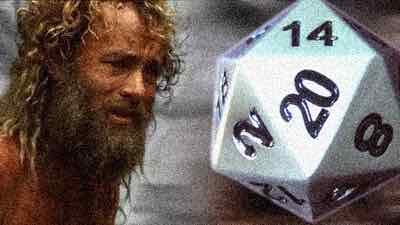Three for Thursday: Desert Island Games

As a kid I read an illustrated version of Robinson Crusoe, and ever since I’ve found desert island questions irresistible. You know, “You’re stranded on a desert island with only one tool. What would it be?”
Or, “You’re stranded on a desert island and you will never be rescued. You can pick what kind of tree grows on the island. What would it be?” That kind of thing.
I’ve also taken it further. For example, “If my gaming group was stranded for the rest of our lives on a desert island with a cargo container full of paper and pencils, and we only had one tabletop RPG with us, what would it be?” It’s ludicrous, I know. But it’s a fun question. Let’s further stipulate that we have the necessary dice, and to make it even more interesting let’s say we get all currently-published supplements for the game.
What’s fascinating to me about this hypothetical is that it favors games with breadth. Sure, we could play a narrowly-focused story game, but after a year or five we’d probably tire of exploring the same small cast of characters in the same situations over and over again. Also, in such a situation we wouldn’t be distracted by the Internet, movies, TV shows, and other gaming-blockers like work and dentist appointments (though having a dentist on our island wouldn’t necessarily be a bad thing, given what Chuck Noland had to endure in Cast Away). So rules complexity wouldn’t necessarily be much of a factor, and a more complex game might actually be more appealing than a simpler one. It would also seem that we’d want a game well-suited to lengthy campaign play.
Since this is Three for Thursday I don’t have to narrow it down to one game. I’m only considering games I’ve actually played, which unfortunately rules out some serious contenders like King Arthur Pendragon and 7th Sea (though the latter might be a bit too on the nose anyway). With those factors in mind, here are three contenders for Desert Island Game:
Burning Wheel — This is a game that requires time. Time to read, time to experiment with, time to truly understand and master. It’s also ideal for long campaigns, deep and evolving character development, and a custom GM-defined setting. Burning Wheel is a fantasy game, so the group would really have to be OK sticking to swords and spells. But I figure there’s enough meat to Burning Wheel to accommodate multiple complex, long-running campaigns before everyone would grow tired of it and start throwing coconuts at each other.
Eclipse Phase — I’ve run two EP campaigns and both times I felt I could do better with more prep. The game world is so expansive, incorporating everything from Martian politics to exurgent viruses to gatecrashing newly-discovered planets. And because the game often provokes philosophical conversations about the nature of consciousness, it would be perfect for those unhurried dawn-to-dusk desert island game sessions.
Genesys — This is a bit of a cheat, because I’ve never actually played the game. But I’ve read it and have played the hell out of the Star Wars games upon which it is based. Genesys is a generic system that puts the onus on the GM to flesh in setting details, which wouldn’t be a problem on the island. The mechanics are fairly traditional in terms of how characters are defined and how they advance, but the central task resolution mechanic gives players and the GM the latitude to adjust granular narrative control. I could see it supporting several campaigns covering a variety of genres. Speaking of which, the Realms of Terrinoth and Shadow of the Beanstalk supplements could be mashed up to create an interesting alternative to Shadowrun. Hmmm… .
Bonus: There’s one game in particular I just know people will grumble should be on this list, because it lends itself to so many kinds of campaigns, and because it is supported by dozens of truly top-notch sourcebooks. It doesn’t scratch the itch for me, but GURPS has many adherents.
Ω